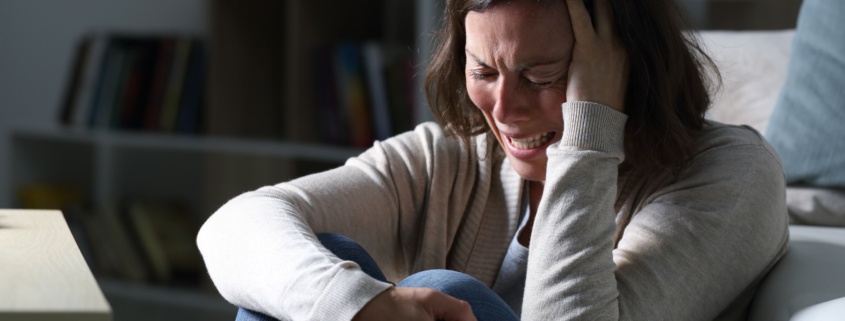Whether your loved one was taken from you suddenly or slowly over time, their absence is painful. The sudden empty dining room chair. Their forgotten half-full mug on the counter. The missed Sunday night phone call.
You are not alone in feeling the devastating effects of losing a loved one. Here are a few of the most common emotions that arise when coping with grief and loss.
Anxiety
If your loved one was your household’s main breadwinner or provided critical daily support, such as in the case of a caretaker, their death may release a host of anxieties.
As unhelpful as it sounds, your anxieties may be grounded in reality. But some of them might not be. The latter anxieties can be helped with coping mechanisms such as prioritizing sleep, developing a go-to phrase to stop negativity spirals, deep breathing, or progressive muscle relaxation.
That said, the value of a good therapist or friend shouldn’t be underestimated when coping with grief and loss.
For anxieties rooted in reality, you may be able to get assistance from local social services. Social workers can help connect you with programs and services to help ensure your care.
Denial
When faced with admitting that a loved one is gone, some people will go into shock, deny the loss entirely, downplay what’s going on, or refuse to address any related issues, such as funeral planning. This is a coping mechanism that partially protects people from feeling vulnerable or unsafe.
In some cases, short-term denial can be helpful because it gives people a chance to process the trauma and loss they’ve just experienced. However, denial is an attractive haven from pain and suffering, which means some people will hold onto this feeling for as long as possible. That leads to people refusing to take necessary action, which can prolong the grieving process.
Overcoming denial involves bravely facing the facts about your situation. This is a difficult step to take and may require the support of others.
Despair
Perhaps the most ubiquitous emotional response to grief, despair is a loss of hope. Without your loved one, what more is there to look forward to? Despair can easily morph into depression when coping with grief and loss, so you must work with a licensed mental health professional who can safely guide you through the grieving process.
Though you may not consciously recognize despair, your behavior tells a different story. You may find yourself exhausted, unable to sleep or sleeping too much without being rested. Your food may expire as you forget to eat because you’ve completely lost your appetite. Perhaps your usually clean home goes untidied and calls go unreturned.
If you feel that despair has crept into your home and isolated you from your support network and life, reach out to your loved ones or care team, regardless of how long you’ve ignored their calls or texts. Despair demands outside help. It’s extremely hard, but you need to ask for it.
Guilt
Guilt that arises alongside coping with grief and loss comes in two main forms: self-blame and regret.
If your internal monologue keeps telling you that you could have prevented your loved one’s death if only you acted differently, you’re dealing with guilt. This type of internal monologue means that you’re placing at least some of the responsibility for your loved one’s passing on yourself. Not only is that cruel and unhelpful, it likely isn’t true. You cannot control everything, and you can’t account for all variables all the time.
Reach out to your family and friends to ask for help and hear a more objective point of view. In addition, working with a therapist may help you to move past this guilt.
Are you struggling with loss?
You are not alone. Ask for help from friends and family if possible. Consider seeking out a therapist and a support group regardless of the status of your current support network. Support groups allow you to connect with and hear from people who have suffered similar losses.
If you need immediate emotional support, contact the SAMSA national hotline at 1-800-662-4357 or the National Suicide Prevention Hotline at 1-800-273-8255.
Have you lost a loved one due to negligence or misconduct?
Contact an experienced Florida wrongful death lawyer today. At Lytal, Reiter, Smith, Ivey & Fronrath, wrongful death cases are handled with compassion and care.
We know that pursuing legal action may seem impossible amid grief and shock. That’s why we’re here to help. Call us at (561) 655-1990 or visit our website to schedule your free consultation.




